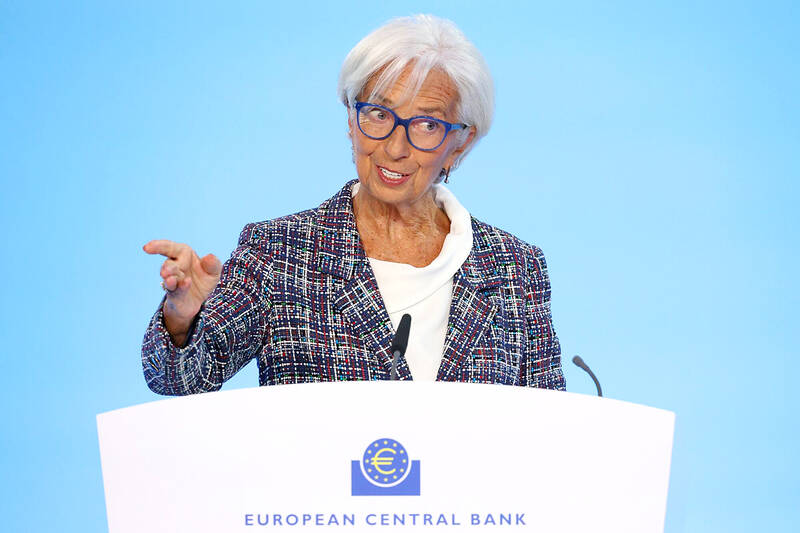The European Central Bank (ECB) left its key interest rate benchmark unchanged yesterday as its rate-setting council and ECB President Christine Lagarde take their time to make sure stubborn inflation is firmly under control before lowering rates again.
The decision leaves the deposit rate at 3.75 percent, where it has stood after a single quarter-point cut rate at the previous meeting on June 6.
That means home buyers and businesses hoping for lower interest rates in Europe are going to have to wait at least until the bank’s September meeting for more affordable credit — and possibly even longer than that.

Photo: Alex Kraus, Bloomberg
Lagarde would not commit to a rate cut even at the Sept. 12 meeting, saying that “the question of September and what do we do in September, is wide open and will be determined on the basis of all the data that we will be receiving” ahead of the meeting.
Lagarde was asked at her post-decision news conference about the potential impact of higher US tariffs on imports if former US president Donald Trump returns as president in the November election. “I’m not going to speculate on political developments,” she said.
“Of course, we have to take into account the consequences of, for instance, the increase in tariffs or policies that are determined, outside of the euro area by any country with which we have either strong trade or financial links.” she said.
She added that “obviously, given the size of the US financial markets in particular, the developments taking place in the United States will be very carefully assessed to see what consequences it might have on the European Union and on the euro area in particular.”
The ECB’s stance for now resembles that of the US Federal Reserve, which is expected to hold off lowering rates at its next meeting on July 30-31, though the Fed appears closer to cutting rates after that than is the ECB.
Inflation in the eurozone has fallen from a peak of 11.6 percent in October 2022 to 2.5 percent last month, slowly approaching the ECB’s goal of 2 percent considered best for the economy. But the last mile has been tough. Inflation figure has been stuck between 2 percent and 3 percent for months.
Workers have been negotiating higher wages to make up for lost purchasing power during the inflation spike and annual price increases remain too high at 4.1 percent last month in the crucial services sector.
Meanwhile, higher rates have slowed growth, which is in short supply in the eurozone, with GDP growing a tepid 0.3 in the first three months of the year after months of stagnation around zero.
The anti-inflation campaign has killed off a years-long rally in eurozone house prices, as mortgage costs weigh on home sales. Several eurozone countries including Spain and Ireland have large numbers of people with adjustable-rate mortgages who have faced sticker shock when looking at their monthly payments. Financing costs have also risen for renewable energy projects such as wind turbines, a key part of the EU’s effort to reduce greenhouse gas emissions.
However, the ECB can point to a strong jobs market with low unemployment as a sign that higher rates are not sending the economy into a recession.

The US dollar was trading at NT$29.7 at 10am today on the Taipei Foreign Exchange, as the New Taiwan dollar gained NT$1.364 from the previous close last week. The NT dollar continued to rise today, after surging 3.07 percent on Friday. After opening at NT$30.91, the NT dollar gained more than NT$1 in just 15 minutes, briefly passing the NT$30 mark. Before the US Department of the Treasury's semi-annual currency report came out, expectations that the NT dollar would keep rising were already building. The NT dollar on Friday closed at NT$31.064, up by NT$0.953 — a 3.07 percent single-day gain. Today,

‘SHORT TERM’: The local currency would likely remain strong in the near term, driven by anticipated US trade pressure, capital inflows and expectations of a US Fed rate cut The US dollar is expected to fall below NT$30 in the near term, as traders anticipate increased pressure from Washington for Taiwan to allow the New Taiwan dollar to appreciate, Cathay United Bank (國泰世華銀行) chief economist Lin Chi-chao (林啟超) said. Following a sharp drop in the greenback against the NT dollar on Friday, Lin told the Central News Agency that the local currency is likely to remain strong in the short term, driven in part by market psychology surrounding anticipated US policy pressure. On Friday, the US dollar fell NT$0.953, or 3.07 percent, closing at NT$31.064 — its lowest level since Jan.

The New Taiwan dollar and Taiwanese stocks surged on signs that trade tensions between the world’s top two economies might start easing and as US tech earnings boosted the outlook of the nation’s semiconductor exports. The NT dollar strengthened as much as 3.8 percent versus the US dollar to 30.815, the biggest intraday gain since January 2011, closing at NT$31.064. The benchmark TAIEX jumped 2.73 percent to outperform the region’s equity gauges. Outlook for global trade improved after China said it is assessing possible trade talks with the US, providing a boost for the nation’s currency and shares. As the NT dollar

The Financial Supervisory Commission (FSC) yesterday met with some of the nation’s largest insurance companies as a skyrocketing New Taiwan dollar piles pressure on their hundreds of billions of dollars in US bond investments. The commission has asked some life insurance firms, among the biggest Asian holders of US debt, to discuss how the rapidly strengthening NT dollar has impacted their operations, people familiar with the matter said. The meeting took place as the NT dollar jumped as much as 5 percent yesterday, its biggest intraday gain in more than three decades. The local currency surged as exporters rushed to